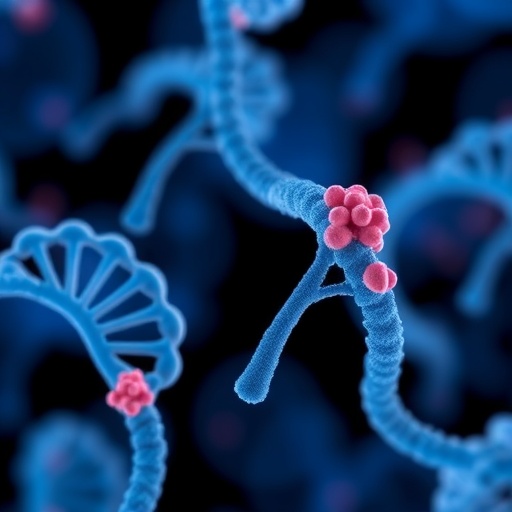A recent groundbreaking study published in JAMA has uncovered striking insights into the prevalence of pathogenic genetic variants associated with cancer susceptibility within a broad, unselected population. This large-scale investigation revealed that approximately 5.05% of individuals carry pathogenic or likely pathogenic variants in key cancer-associated genes—significantly higher than previously anticipated. These findings promise to reshape current understanding of genetic risk and cancer screening paradigms, offering new avenues toward precision oncology and population health management.
The study harnessed state-of-the-art genomic sequencing technologies to investigate germline variants across a vast cohort drawn without prior selection based on family history or cancer diagnosis. This unbiased approach ensured a comprehensive overview of the genetic landscape in a general population, providing robust epidemiological evidence that challenges the assumption that high-risk variants are confined to specific at-risk groups. By mapping the incidence of these variants at a population level, researchers shed light on the hidden burden of inherited cancer risk factors.
One of the most compelling implications of this discovery lies in its potential to inform early detection strategies. Traditionally, genetic testing has been reserved for individuals with a personal or strong familial background of cancer. However, the new data suggest that actionable pathogenic variants may be relatively common even in those lacking obvious indicators for genetic screening. This broadens the scope for integrating germline genetic analysis into routine preventive care and cancer risk assessment frameworks.
Pathogenic and likely pathogenic variants identified span several key genes known for their critical roles in DNA repair, cell cycle regulation, and tumor suppression. Variants in such genes can disrupt essential genomic maintenance mechanisms, leading to increased oncogenic potential through the accumulation of mutations. This molecular insight underscores why these carriers exhibit heightened cancer susceptibility and highlights the biological significance of the discovered variant frequencies.
The methodology utilized involved comprehensive next-generation sequencing (NGS) paired with rigorous bioinformatic pipelines to accurately classify variants according to their pathogenicity. The clinical interpretation adhered to established guidelines such as those from the American College of Medical Genetics and Genomics (ACMG), ensuring the reliability of variant classification. This technical rigor reinforces the validity of the 5.05% prevalence estimate and lends credibility to the proposed population genetic risk profile.
Importantly, this research also addresses the evolutionary and demographic factors influencing the distribution of pathogenic variants across diverse populations. The observed prevalence rates reflect complex interactions between genetic drift, selective pressures, and founder effects. Understanding these population dynamics will be critical in tailoring precision medicine interventions and in the equitable deployment of genetic testing resources globally.
From a clinical perspective, the study advocates for a paradigm shift toward population-level genetic screening programs. Identifying individuals harboring high-risk germline variants before cancer onset could enable preemptive measures such as intensified surveillance, risk-reducing surgeries, or targeted chemoprevention. These proactive interventions hold the promise of markedly improving patient outcomes and potentially reducing healthcare costs associated with late-stage cancer treatments.
Additionally, these findings underscore the significance of genetic counseling and the ethical considerations surrounding widespread genomic testing. Delivering genetic information to ostensibly healthy individuals requires carefully constructed frameworks to support informed decision-making, psychological well-being, and privacy. The study implicitly calls for healthcare systems to prepare for the challenges accompanying the integration of genomics into standard care.
On the research front, this study sets a foundation for future investigations into the penetrance and expressivity of various pathogenic variants, as well as gene-environment interactions modulating cancer risk. Longitudinal studies tracking variant carriers will be indispensable for delineating natural history and for refining individualized risk prediction algorithms. Moreover, expanding research to include underrepresented populations is imperative to capture the full spectrum of genetic variation impacting cancer susceptibility.
The public health implications are profound as realizing the potential benefits of these findings will require coordinated efforts involving policymakers, clinicians, geneticists, and patient advocacy groups. Establishing guidelines for population-wide genetic testing and ensuring equitable access to testing and subsequent care are critical steps toward harnessing this genomic revolution.
Lastly, the study amplifies the urgency of integrating genomics education into medical training and public awareness campaigns. Empowering healthcare providers with robust genetic literacy and educating the public on the implications of genetic findings can foster acceptance and appropriate utilization of genetic risk information.
Dr. Joshua Arbesman, the corresponding author, emphasizes that this study is a pivotal step toward understanding the true burden of inherited cancer risk and envisions a future where genomic data empowers precision prevention strategies at a population level. The full article, published in JAMA and accessible via its DOI, provides an exhaustive account of the methods, author contributions, and supporting data that validate these transformative results.
Subject of Research: Prevalence and implications of pathogenic germline variants in cancer susceptibility genes among an unselected population
Article Title: Not specified
News Publication Date: Not specified
Web References: Not specified
References: (doi:10.1001/jama.2025.16372)
Image Credits: Not specified
Keywords: Cancer, Germlines, Genes, Pathogens, Population, Oncology
Tags: cancer risk factorscancer susceptibility genesEarly detection strategiesepidemiological evidence in cancergenomic sequencing technologiesgermline variants investigationhigh-risk genetic variantsinherited genetic mutationspathogenic genetic variantspopulation health managementprecision oncology advancementsunselected population cancer study





